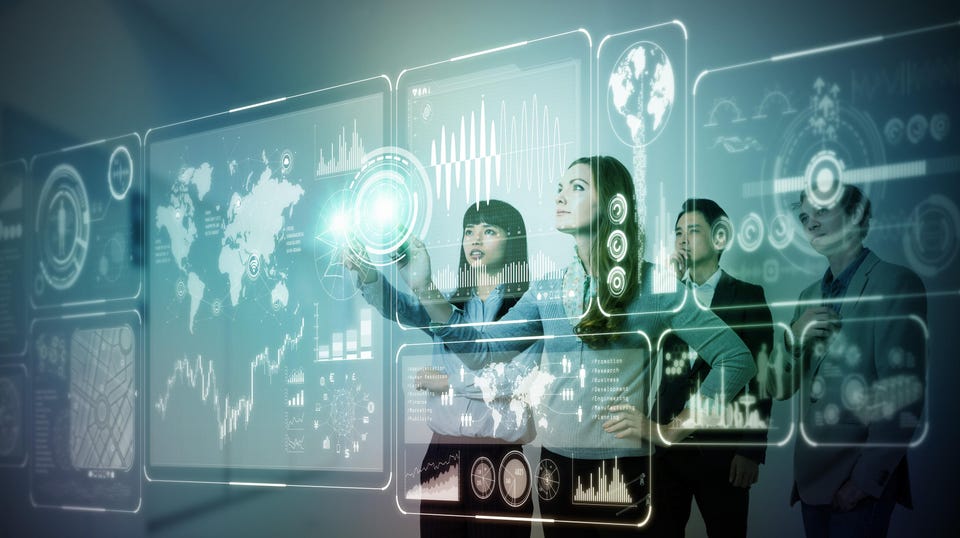Enterprise Tech Economist’s View Of Artificial Intelligence: Beyond Cheaper Prediction Power Joe McKendrick Contributor Opinions expressed by Forbes Contributors are their own. I track how technology innovations move markets and careers Following New! Follow this author to stay notified about their latest stories. Got it! Sep 17, 2022, 07:00am EDT | Share to Facebook Share to Twitter Share to Linkedin AI takes on predictive power; humans retain judgement.
getty There has been no shortage of attention given to the potential of artificial intelligence, along with related concerns about bias, data viability, costs, and employee resistance. But we may be missing the most important point when it comes to AI’s ultimate impact, a leading AI proponent argues. That is, we’re starting to outsource a large share of human decision-making to machines, which may have unforeseen implications — beyond simply making cheaper predictions.
It’s time to start looking at AI not from a technologist’s perspective, but from an economist’s perspective, states Ajay Agrawal, professor at the University of Toronto, and co-author of Power and Prediction: The Disruptive Economics of Artificial Intelligence . Agrawal recently shared his views on the coming AI wave in a talk hosted at the University of British Columbia’s Green College. AI is moving into its next phase — moving up the decision-making food chain.
This is where AI is moving from sidelines to a more central role in the economy, he says. Overall, there has been disappointment with AI, as it does not appear to be delivering the miracles initially promised, he adds, noting that many “things seem much less impacted than what we thought. ” Productivity growth even still continues to decline.
At the same time, Agrawal continues, AI is still a work in progress, and we’re just beginning to see it unfold. Agrawal maintains that it’s time to take an “economist’s view” of AI. “A computer scientist or an engineer will talk about AI in terms of advances in neural networks.
But if you ask an economist what’s going on with AI, they will characterize it as a drop in the cost of prediction. As AI gets better and better, it effectively makes prediction cheaper and cheaper. ” This is significant because “we use prediction everywhere.
Prediction is embedded in all kinds of things where you might not think of prediction — for example, autonomous driving. ” Decision-making, which is the source of financial and political power in the economy, has two components: prediction and judgment, Agrawal says. These two functions are being decoupled in AI systems — humans are retaining judgement, but turning prediction over to AI.
“We are constantly making some form of a probability assessment and a judgment assessment whether we realize it or not,” he says. “The rise of AI is shifting one of those ingredients – prediction – from humans to machines. We’re outsourcing the prediction part to the machine.
” Recommended For You 1 The 5 Biggest Technology Trends In 2022 More stories like this Fewer stories like this 2 ‘Enthusiastic Entrepreneurs’: Pre-IPO Statements On Profitability Prove To Be Larger Than Real Life More stories like this Fewer stories like this 3 The 7 Biggest Artificial Intelligence (AI) Trends In 2022 More stories like this Fewer stories like this To date, AI has focused on point solutions — transcribing text, detecting errors in production lines, and so forth. “We’ve picked all the low-hanging fruit of all the point solutions where you just get a prediction, the prediction leads to a simple action,” Agrawal says. “Like a tool — linked to a camera — that predicts if a tooth on a digger in a mining operation if the tooth is broken.
That’s a point solution, a prediction that leads to a specific action. It doesn’t impact anything else in the operation. ” AI begins to realize greater value “when you start building a fully autonomous system, where one prediction one decision impacts all many other decisions,” Agrawal points out.
“From an economics perspective, we’re into the realm of game theory, where if we change a decision how does that impact all other decisions?” Moving the predictive aspect of decisions to machines can be an eye-opening experience as it rolls out. AI opens the door to “a flourishing of new decisions,” Agrawal says. “Many of these decisions are new because we previously hid them via rules, insurance and over-engineering,” he says.
“We did such a good job hiding them that we’ve long since forgotten they were ever there. AI is unearthing these long-hidden, latent decisions. ” This is more than an exercise in creativity — it means power.
“Decision-making confers power; changes in decision-making can lead to changes in power,” he says. “Centralizing or decentralizing decision-making will consolidate or distribute power. ” This means transformation throughout the economy, Agrawal states.
“AI is arguably the first tool in human history that learns as you use it. The more you use it, the smarter it gets because every time you use it. ” Follow me on Twitter .
Joe McKendrick Editorial Standards Print Reprints & Permissions.
From: forbes
URL: https://www.forbes.com/sites/joemckendrick/2022/09/17/economists-view-of-artificial-intelligence-beyond-cheaper-prediction-power/



